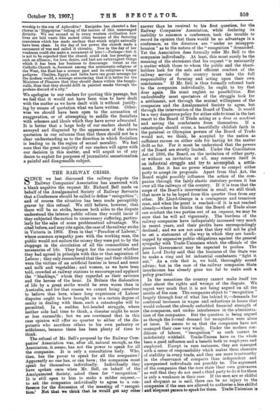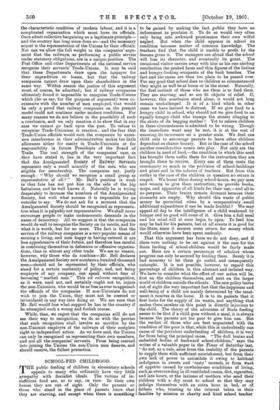THE RAILWAY CRISIS.
SINCE we last discussed the railway dispute the Railway Companies' Association has answered with a blank negative the request Mr. Richard Bell made on behalf of the Amalgamated Society of Railway Servants that a Conference should be called to define" recognition"; and of course the situation has been made perceptibly graver by this refusal. We still believe, however, that there will be no strike, because both sides to the dispute understand the intense public odium they would incur if they subjected the nation to unnecessary suffering, particu- larly for the sake of some problematical advantage. We cited before, and may cite again, the case of the railway strike in Victoria in 1903. Even in that "Paradise of Labour," where common sympathy goes with the working man, the public would not endure the misery they were put to by the stoppage in the circulation of all the commodities and necessaries of life. They forgot for the moment whether they had agreed in principle with this or that aspiration of Labour ; they only remembered that they and their children were the victims of an artificial famine in bread and meat and milk and vegetables ; and women, as we have been told, crowded at railway stations to encourage and applaud the "blacklegs," whom they regarded as their saviours and the heroes of the hour. In Britain the dislocation of life by a great strike would be even worse than in Australia, and for that reason we cannot bring ourselves to believe that here, where long experience of Labour diiputes ought to have brought us to a certain degree of sanity in dealing with them, such a catastrophe will be permitted. In a sudden hot-headed struggle, where neither side had time to think, a disaster might be more or less excusable ; but we are convinced that in this case opinion will offer no quarter to either of the dis- putants who sacrifices others to his own pedantry or selfishness, because there has been plenty of time to think.
The refusal of Mr. Bell's proposal by the Railway Com- panies' Association was, after all, natural enough, as the Association, it seems, has not the power to speak for all the companies. It is only a consultative body. Who, then, has the power to speak for all the companies ? Apparently no one has, or can have ; the companies must speak for themselves individually. Individually they have spoken once when Mr. Bell, on behalf of the Amalgamated Society, asked them for "recognition." It is still open to him to make a milder request,— to ask the companies individually to agree to a con- ference for the discussion of the meaning of " recogni- tion.' Not that we think that he would get any other answer than he received to his first question, for the Railway Companies' Association, while declaring its inability to summon a conference, took the trouble to record its opinion that there would be no advantage in a conference, as the directors are "under no misappre- hension" as to the nature of the " nition " demanded. Yet the Association does formally refer Mr. Bell to the companies individually. At least, this must surely be the meaning of the statement that his request "is necessarily a matter which those to whom the public and the share- holders look for the safe and efficient conduct of the railway service of the country must take the full responsibility of forming and acting upon their own conclusions." If Mr. Bell is thus formally referred back to the companies individually, he ought to try that door again. He must neglect no possibilities. But undoubtedly most spectators of the struggle look for a settlement, not through the mutual willingness of the companies and the Amalgamated Society to agree, but through the intervention of the Board of Trade. It would be a very dangerous policy for either side to trust in the last resort to the Board of Trade acting as a deus en machinct and saving the combatants from themselves. If a catastrophe should occur, a beautifully childish faith in the paternal or Olympian powers of the Board of Trade would not, we think, be accepted by the nation as sufficient excuse on either side for having let the matter drift so far. For it must be understood that the powers of the Board are strictly limited. Under the Conciliation Act of 1896, the Board, on the invitation of either party, or without an invitation at all, may concern itself in an industrial struggle and try to accomplish a settle-. meat. But it has no power whatever to compel either party to accept its proposals. Apart from that Act, the Board might possibly influence the action of the com- panies through the fairly elastic statutory powers it has over all the railways of the country. If it is true that the scope of the Board's intervention is small, we still think that more is to be hoped from this quarter than from any other. Mr. Lloyd-George is a, courageous and tenacious man, and when the point is reached—if it is not reached already—where he thinks that the Board of Trade alone can conduct the two parties out of an impasse, we may be sure that he will act vigorously. The burdens of the railway companies have indisputably increased very much in recent years, and their profits have correspondingly declined ; and we are not sure that they will not be glad to sat a, statement of the way in which they are handi- capped by expensive public obligations against the general sympathy with Trade-Unionism which the officials of the present Government may be expected to profess. The late Lord Derby said. that the business of the State was to make a ring and let industrial combatants "fight it out." As a rule that is, we hold, thoroughly sound advice ; but in the case of the railway companies State interference has already gone too far to make such a. policy practical.
In the meantime the country cannot make itself too clear about the rights and wrongs of the dispute. We regret very much that it is not being argued on all the merits of the case. The companies object to " recognition " largely through fear of what lies behind it,—demands for continual increases in wages and reductions in hours that would exhaust the already enfeebled financial strength of the companies, and undue interference in the administra- tion of the companies. But the question is being argued as though the formal- demand for recognition were alone at issue. It seems to us that the companies have not managed their case very wisely. Under the modern con- ditions of labour, " recognition " as such cannot be indefinitely withheld. Trade-Unions have on the whole been a good influence and a benefit both to employers and employed. Except in rare instances, they are managed with a sense of responsibility which makes them elements of stability in every trade, and they are more trustworthy in the observance of compacts than independent and unorganised individuals can possibly be. The argument of the companies that the men state their own grievances so well that they do not need a third party to do it for them is only a weakness in their case. If the men are so skilful and eloquent as is said, there can be no injury to the companies if the men are allowed to authorise a less skilful and eloquent person to speak for them. Trade-Unionism is the characteristic condition of modern labour, and it is a complicated organisation which must have its officials. Once admit collective bargaining as a legitimate principle— and the country has long since done so—and the necessary sequel is the representation of the Unions by their officials. Nor can we allow the full weight to the companies' argu- ment that the railways, as performing a public service under statutory obligations, are in a unique position. The Post Office and other Departments of the national service recognise their servants' Trade-Unions. It may be said that these Departments draw upon the taxpayer for 'their 'expenditure or losses, but that the railway companies cannot draw upon their shareholders in the same way. Within reason the justice of this argument must, of course, be admitted ; but if railway companies ultimately found it impossible to recognise Trade-Unions • which (let us say, for the purpose of argument) were co- extensive with the number of men employed, that would be only a proof that railway companies on the present model could not continue under modern conditions. For many reasons we do not believe in the possibility of such a conclusion, and we only mention it to show that in any icase we cannot go back upon the past. To refuse to recognise Trade-Unionism is . reaction ; and the fear that Trade-Union officials would ruin the companies by exces- sive interference in their administration makes too little allowance either for sanity in Trade-Unionists or for responsibility in future Presidents of the Board of Trade. The real strength of the companies' case, as ,they have stated it, lies in the very important fact that the Amalgamated Society of Railway Servants represents only a small minority of the men who are eligible for membership. The companies say, justly enough : "Why should we recognise a small group as 'representative of all ? " Mr. Bell's position is weak in that fate has not put him on the side of the big battalions, and he well knows it. Naturally he is trying desperately to increase the numbers of the Amalgamated Society, but with what success it is impossible for an outsider to say. We do not ask for a. moment that the Amalgamated Society should be recognised as representa- tive when it is palpably not representative. We shall never :encourage people to make undemocratic demands in the name of democracy. All we suggest is that the companies :would do well to recognise the Society on its merits, and for what it is worth, but for no more. The fact is that the service of the railway companies is a very popular means of earning a living, and men happy in having entered it are less apprehensive of their future, and therefore less careful in combining themselves in defensive or offensive organisa- tions, than in almost any other trade. We see no reason, however, why those who do combine—Mr. Bell declares the Amalgamated Society now numbers a hundred thousand men—should not be represented by their officials, who stand for a certain continuity of policy, and, not being employes of any company, can speak without fear of becoming "marked men." This ad valorem recognition, as it were, need not, and certainly ought not to, injure the non-Unionists, who would be as free as ever to approach the officials of the companies. If non-Unionists do not wish to join the Union, they must not be coerced or in imidated in any way into doing so. We are sure that Mr. Bell would lose what support he has in the country if be attempted such a wrong and foolish course.
While, then, we regret that the companies still do not see their way to recognition, we do so with the proviso that such recognition shall involve no sacrifice by the non-Unionist employes of the railways of their complete right to independent action. As we have said, the Unions can only be recognised as representing their own members, and not all the companies' servants. From being coerced into joining the Unions the non-Union men deserve, and should receive, the fullest protection. •











































 Previous page
Previous page